- Home
- Blog
- Industry Sharing
- How to Choose the Glass Hardware for Glass Railing and Glass Shower Door?
How to Choose the Glass Hardware for Glass Railing and Glass Shower Door?
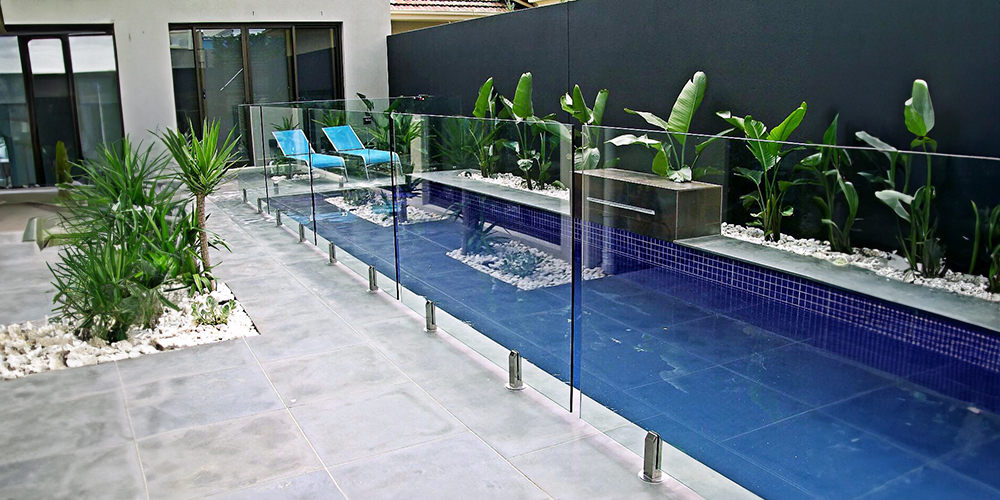
There are various styles of glass hardware accessories. You need to choose the right products for glass railings or glass shower doors in order to maximize their effectiveness.
For example, if you are installing glass railings, you may need to consider the type of glass clamp or patch fitting that will best secure the glass panels in place. For glass shower doors, you may need to choose hinges and handles that are corrosion-resistant and can withstand frequent use and exposure to moisture.
There are as many as 14 categories listed on our website, which are also divided into different types due to functions.
In this article, we will introduce you the six most frequently asked glass hardware, namely: glass clamp, glass door handle, glass sliding door hardware, patch fitting, glass door lock, glass hinge.
〈Extended reading: How to Choose the Right Architectural Railing Hardware?〉
6 Common Types of Glass Hardware
1. Glass Clamp
A glass clamp is a type of glass hardware component that is used to secure glass panels in place in various architectural applications. Glass clamps are commonly used in glass railing systems, where they hold the glass panels in place while also providing a secure attachment point for the handrail.
There are several types of glass clamps, including: Square glass clamps, Round glass clamps, Adjustable glass clamps. Glass clamps can be made from a variety of materials, such as stainless steel, aluminum, or brass, and they typically feature a sleek and minimalistic design to complement the transparent nature of the glass.
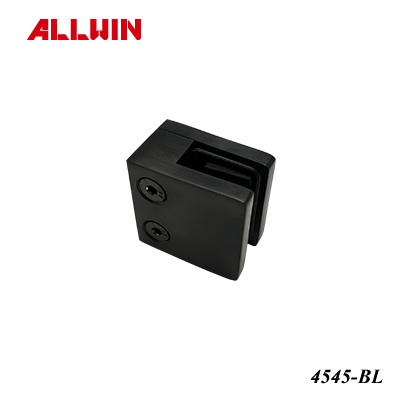
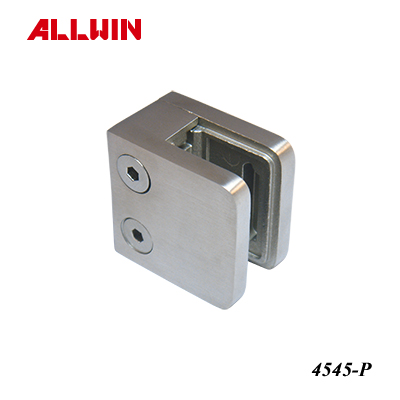
〈Related Product: Glass Clamp / Clamp Connector〉
2. Glass Door Handle
A glass door handle is a type of glass hardware accessory that is specifically designed for use on glass doors. It is typically attached to the edge or surface of the glass door and serves as a means of opening and closing the door. Glass door handles come in various styles, sizes, and materials, such as stainless steel, brass, or aluminum, to complement the design of the door and its surroundings.
The most common types of glass door handles include single-sided handles and double-sided handles. Single-sided handles are attached to one side of the door and are commonly used on shower doors, while double-sided handles are attached to both sides of the door and are typically used on sliding glass doors or swinging doors.
Glass door handles can also have various features, such as a locking mechanism, which provides added security and privacy. Some glass door handles are designed to be flush-mounted or recessed, creating a sleek and minimalist look.
.jpg)
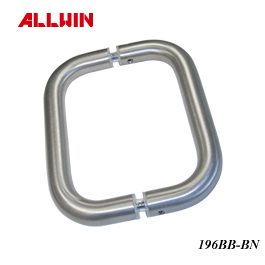
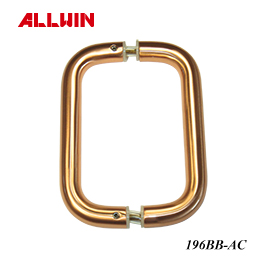
〈Related Product: Glass Door Handle〉
3. Glass Sliding Door Hardware
Glass sliding door hardware is a type of glass hardware designed specifically for sliding glass doors. It includes various components such as tracks, rollers, handles, locks, and stops, that work together to allow the smooth and effortless sliding of the door. Glass sliding door hardware can be used in various settings, such as homes, offices, hotels, and retail spaces, to create a modern and open feel.
The most common types of glass sliding door hardware include top-hung systems and bottom-rolling systems. Top-hung systems are suspended from an overhead track, while bottom-rolling systems feature rollers that slide along a track at the base of the door. Both systems can support large, heavy glass doors and provide a sleek and minimalist look.
When choosing glass sliding door hardware, it's important to consider the weight and size of the door, as well as the desired aesthetic and level of security. Consulting with a reputable glass hardware supplier or a professional installer can help ensure you choose the most appropriate hardware for your project.
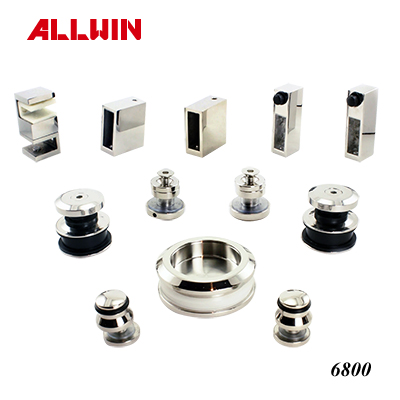
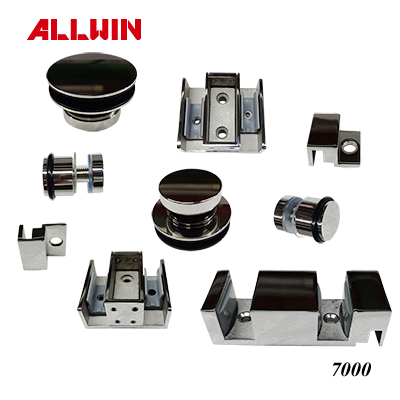
〈Related Product: Glass Sliding Door Hardware〉
4. Patch Fitting
Patch fittings are a type of glass hardware used to attach and secure glass doors and panels to a supporting structure. They consist of metal plates, usually made of stainless steel, that are attached to the glass panel using screws or other fasteners. Patch fittings come in a variety of shapes and sizes to accommodate different types of glass and door configurations.
The main purpose of patch fittings is to provide a secure and reliable connection between the glass panel and the supporting structure, while also allowing for some flexibility and movement of the glass. Patch fittings are particularly useful for large and heavy glass panels, where traditional hinges or door closers may not provide enough support.
Some advantages of patch fittings include their durability and strength, as well as their sleek and modern appearance. Because they are made of high-quality materials like stainless steel, they can withstand heavy use and resist corrosion and wear over time. Additionally, patch fittings are often used in contemporary architectural designs because of their minimalistic appearance, which can enhance the aesthetic appeal of the space. Overall, patch fittings are a reliable and stylish solution for attaching glass doors and panels to a supporting structure.
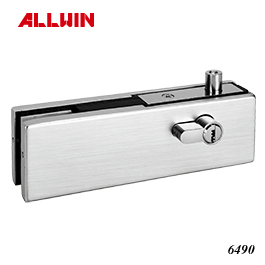
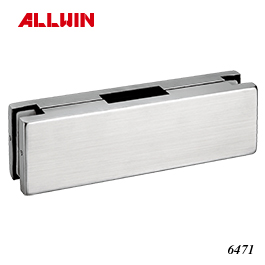
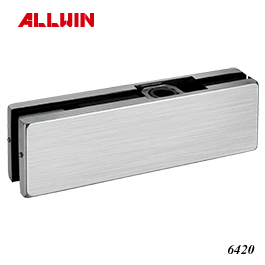
〈Related Product: Patch Fitting〉
5. Glass Door Lock
A glass door lock is a type of lock specifically designed to secure glass doors, such as those used in commercial buildings, residential homes, and offices. Glass door locks come in different types, such as mortise locks, cylinder locks, and deadbolts, and are made of durable materials such as stainless steel or brass.
The mechanism of a glass door lock depends on the type of lock. In general, a mortise lock is installed within the door, with a latch bolt that slides into a mortise on the frame to hold the door in place. A cylinder lock uses a key to turn a cylinder mechanism inside the lock, which either extends or retracts a bolt that holds the door in place. A deadbolt works similarly to a cylinder lock, but it has a single, solid bolt that extends deep into the door frame for added security.
Most glass door locks are operated by a key, but some may also include additional features such as keypad entry, biometric scanning, or electronic access control. When a key is inserted into the lock, it turns the lock cylinder or bolt mechanism, releasing or engaging the latch or bolt and allowing the door to be opened or closed.
Overall, glass door locks are essential for ensuring the security and safety of glass doors and the spaces they protect.
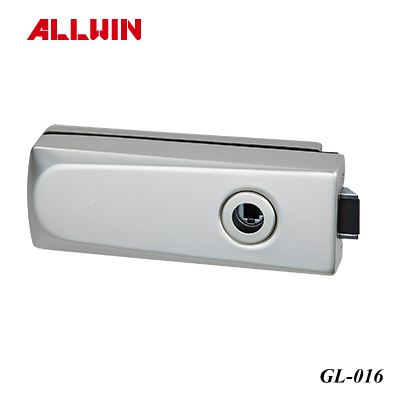
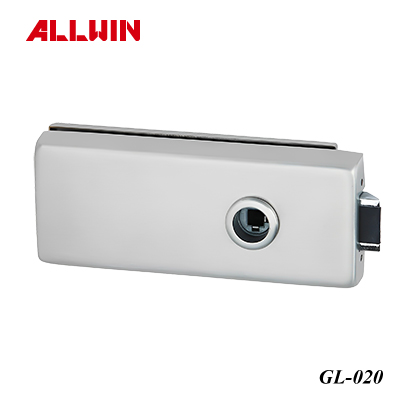
〈Related Product: Glass Door Lock〉
6. Glass Hinge
Glass door hinges are specialized glass hardware designed to connect and support glass doors. They are typically made up of two metal plates that are attached to the door frame and the glass door itself. The hinges must be able to support the weight of the glass door, which can be quite heavy, as well as the forces generated by opening and closing the door.
There are several different types of glass door hinges, including pivot hinges, butt hinges, and continuous hinges. Pivot hinges are mounted on the top and bottom of the door frame and allow the door to pivot open and closed. Butt hinges are mounted on the edge of the door and the door frame and allow the door to swing open and closed. Continuous hinges, also known as piano hinges, run the entire length of the door and provide continuous support along the entire edge of the door. The right hinge for a given door will depend on the weight and size of the door, as well as the type and thickness of the glass used. Choosing the right hinge is essential for ensuring that the door operates smoothly and safely.
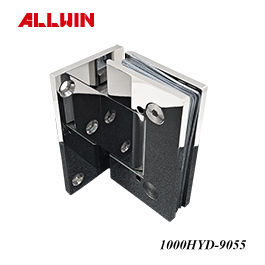

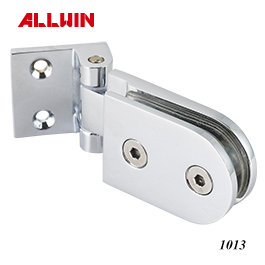
〈Related Product: Glass Hinge〉
5 Tips to Choose the Right Glass Hardware
Choosing the right glass hardware for glass railing and glass shower doors is crucial to ensuring safety, durability, and functionality. Here are some tips to help you choose the right hardware for these applications.
1. The Type of Glass
The type of glass used in your railing or shower door will determine the type of hardware you need. For example, tempered glass is required for safety reasons in glass railing applications, and thicker glass is often used for shower doors to ensure durability.
2. High-quality Material
Glass hardware needs to withstand heavy use and constant exposure to water and moisture. Look for hardware made of high-quality materials such as stainless steel, brass, or aluminum, which are corrosion-resistant and durable.
3. The Weight and Size of the Glass
Glass railing and shower doors come in different sizes and thicknesses, so it's important to choose hardware that can support the weight and size of the glass. Be sure to check the weight capacity and load-bearing capabilities of the hardware you choose.
4. Safety Features
Safety is a top priority when it comes to glass hardware for railing and shower doors. Look for hardware that includes safety features such as anti-slip grips or locks to prevent accidental falls or breakdown.
5. Design
Glass hardware can add a stylish and modern look to your railing or shower door. Consider choosing hardware that complements your design and enhances the overall aesthetic of your space.
By taking these factors into account, you can choose the right glass hardware for your railing or shower door that meets your functional, safety, and design requirements. If you're unsure which hardware to choose, it's always best to consult with a glass hardware specialist who can provide expert advice and guidance.
〈Extended reading: Seamless Showers: How Shower Glass Clamps Enhance Frameless Doors〉
Frequently Asked Questions about Glass Door Hinges
Q1: How do I determine the correct measurements for glass hardware when installing on the custom glass railings or shower doors?
A1: To ensure accurate measurements, refer to technical drawings from the hardware supplier. Factors like glass thickness, mounting style (wall-mounted, glass-to-glass, or floor-supported), and hardware function all matter. For custom applications, also consider edge finishes and hole positions. Manufacturers like ALLWIN typically offer detailed specs and drawings to help guide the process.
Q2: Are there any specific maintenance tips to prolong the lifespan and appearance of glass hardware, especially in humid environments like bathrooms?
A2: Regularly wipe down hardware with a soft, dry cloth to reduce moisture buildup. In humid areas like bathrooms, choose corrosion-resistant materials such as stainless steel or brass with protective finishes. Avoid harsh cleaners—use mild soap and rinse with water. Many suppliers, including ALLWIN, offer products designed for high-moisture environments and tested for durability.
Q3: Can I mix and match different finishes of glass hardware (e.g., stainless steel and brass) in a single installation, and what design considerations should I keep in mind?
A3: Yes, mixing finishes can work well if done with balance. Repeat each finish in at least two or three areas to keep the look cohesive—for example, pairing brushed brass hinges with towel bars in the same tone. Stick to complementary color temperatures (warm with warm, cool with cool) to avoid visual clash. Suppliers like ALLWIN offer options such as brushed gold, gun metal, matte black, and polished chrome to support coordinated design choices.
Q4: What are the best practices for cleaning glass hardware to avoid scratches or damage, particularly for delicate finishes?
A4: Clean glass hardware with a soft microfiber cloth and avoid abrasive materials. A mild soap solution is safe for most finishes. For delicate or matte surfaces, test any cleaner on a small area before full application.
Q5: When buying glass hardware, what are some simple ways to check if the quality is good, even if I'm not an expert?
A5: Check the weight and feel—quality hardware often feels solid and well-finished. Look for smooth edges, a consistent surface, and signs of good machining. Some suppliers, like ALLWIN, also provide material test data and clear specs to help buyers make informed choices.
Conclusion
When looking for a reliable glass hardware supplier, there are several factors to consider. Firstly, check their product range to ensure they offer a variety of glass hardware products that meet your needs. Next, assess the quality of their products, including the materials used, to ensure they are durable and long-lasting. Additionally, look for customer reviews and testimonials to gauge the supplier's reputation, as well as their level of customer service and responsiveness. It's also important to consider their delivery and logistics services, as well as their pricing, to ensure they are competitive and reliable.
By considering these factors, we recommend ALLWIN as your glass hardware supplier. ALLWIN glass hardware supplier has professional OEM/ODM service to meet customers' needs. Rigorous process capability and good customer service are also our proud advantages. If you have any problems with glass hardware, please feel free to contact us.
〈Extended reading: How Does the Glass Sunction Cup Work?〉
Article Classification
Recent Articles
- Shower Door Parts: A Complete Guide to Identification and Replacement
- Frameless Glass Hardware: Engineering the Beauty of Transparent Design
- The Complete Shower Door Seals Guide | Stop Leaks and Mold for Good
- How to Choose Handrail Brackets? The Ultimate Guide About Types, Spacing, and Installation
- The Essential B2B Guide to Stainless Steel Handrail Brackets: Selection, Specification, and Design

